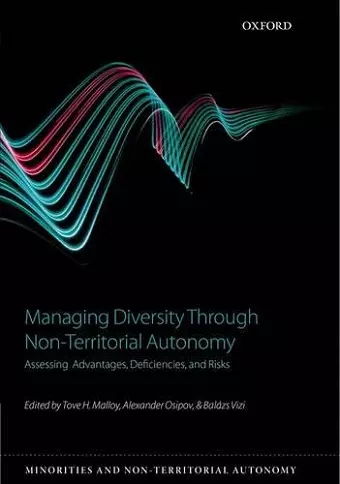Managing Diversity through Non-Territorial Autonomy
Assessing Advantages, Deficiencies, and Risks
Tove H Malloy editor Alexander Osipov editor Balázs Vizi editor
Format:Hardback
Publisher:Oxford University Press
Published:23rd Jul '15
Currently unavailable, and unfortunately no date known when it will be back

Non-territorial autonomy (NTA) is a statecraft tool that is increasingly gaining importance in societies seeking to accommodate demands by ethno-cultural groups for a voice in cultural affairs important to the protection and preservation of their identity, such as language, education, and religion. As states recognize the specific rights of identity minorities in multicultural and multi-ethnic societies, they are faced with a need to improve their diversity management regimes. NTA offers policy-makers a range of options for institutional design adaptable to specific circumstances and historical legacies. It devolves degrees of power through legal frameworks and institutions in specific areas of ethno-cultural life, while maintaining social unity at the core level of society. Throughout Europe and North America, NTA exists and is implemented at a state, regional, and local level. Much has been written about the concept of autonomy and its usage as a statecraft tool in states facing regional division, but little literature addresses its non-territorial institutional and public administration functions. This edited volume seeks to fill this gap. Managing Diversity through Non-Territorial Autonomy: Assessing Advantages, Deficiencies, and Risks, carves a space for contextual knowledge production on NTA in law, as well as social and political sciences. Contextual knowledge involves a description of institutions and their functionality as well as of the institutional and legal frames protecting these. What are the institutions, bodies, and functions that ethno-cultural groups can draw on when seeking to have a voice over their own affairs, as well as over issues in society related to their identity production? How are these entities incorporated and empowered to have a voice? What degree of voice do they have, and how are they designed to project this voice? Thus, contextual knowledge also involves critical assessment and risk analysis as well as penetrating insights as to the unintended consequences and hidden agendas that may inform NTA policies. This volume is to provide both policy-makers and ethno-cultural groups with a tool-kit that promotes social cohesion while respecting diversity. This is the first volume in a series of five which will examine the protection and representation of minorities through non-territorial means.
[The book] offers a very interesting introduction to the concept of non-territorial autonomy and presents a large number of interesting case studies from Europe and North America, demonstrating that a wide variety of arrangements, as well as policies, might result from it ... The book also contributes significantly to bringing more scientific focus on the concept of non-territorial autonomy ... It should represent a very useful guide not only for those interested in scientific research of non-territorial autonomy, but also policy-makers interested in designing such autonomous arrangements ... The whole book, representing a fairly thorough study of the concept of non-territorial autonomy, surely merits a place on the bookshelf of those interested in increasing their knowledge in this field of study. * Nikola Burazer, The Legal History Review *
ISBN: 9780198738459
Dimensions: 240mm x 162mm x 26mm
Weight: 652g
338 pages